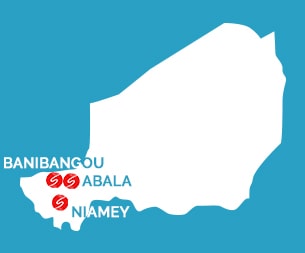
Context
350,000 people were displaced due to the presence of non-state armed groups, violence against civilians and an increasing number of military operations. Niger also provided refuge for 251,000 people fleeing armed groups in neighboring countries. 890 schools were closed as a result of insecurity in the country, affecting 72,000 children. Ongoing hostilities and lack of infrastructure also had a negative impact on food supplies and access to markets in several areas. In 2022, 2.3 million people were suffering from food insecurity and around 457,000 children between 6 months and 5 years old were malnourished.
- 25.25 million inhabitants
- 189th out of 191 countries on the Human Development Index
Our action

-
Mission
opened in 2020 (re-opening) -
Team
5 international staff
30 national staff - Budget 1.02M€
SOLIDARITÉS INTERNATIONAL consolidated its presence in the Tillaberi region, gradually expanding its activities into difficult-to-access areas where there is low coverage of humanitarian needs. Our NGO once again demonstrated its “front line” stance by opening a second operational base in the region in August 2022 (in Banibangou, close to the border with Mali). This posture has enabled our organization to become a major actor in the area.
Using HAACT (Humanitarian Analysis for Access in Challenging Contexts), our teams compiled humanitarian information on difficult-to-access zones, enabling us to deliver humanitarian assistance to isolated areas.
Institutional and private funding partners DG ECHO, CDCS, BHA, SDC (Swiss Cooperation),
ALTHEMIS Foundation
Operating partners Mercy Corps, ALIMA
Our impact

Emergency multi-sectoral response
- Distribution of essential non-food items
- Emergency rehabilitation of water points
- Construction of emergency latrines in camps for displaced people

Access to essential goods and services, livelihood recovery
- Construction/rehabilitation of water points
- Creation/revitalization of water point management committees
- Hygiene promotion in crisis contexts
- Monitoring water quality

Improving the resilience of individuals, communities and institutions
- Building expertise among local actors
- Training health workers on infection control and prevention
Should you have any questions, please contact Xavier Lauth

Vacancies
At head office
Worldwide
Internships
